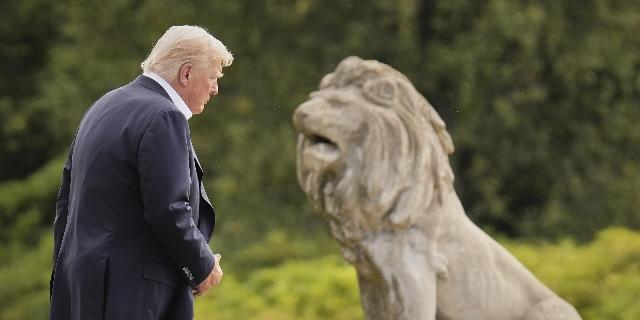Politico: Trump and Starmer's positions on the Ukrainian conflict have diverged
US President Donald Trump and British Prime Minister Keir Starmer have failed to present a united front on the Ukrainian conflict, Politico writes. In response to calls to put more pressure on Putin, the American leader made it clear that Europe would first have to take action on its own.
Eli Stokols
At the press conference, which was generally held in a friendly atmosphere, the British leader urged the president to be tougher with Putin.
Despite all their assurances of admiration for each other and close cooperation, US President Donald Trump and British Prime Minister Keir Starmer have failed to present a united front on the Russian-Ukrainian conflict.
The leaders said they wanted a cease-fire, but disagreed on the best way to put pressure on Russian President Vladimir Putin, who has escalated attacks on Ukraine in recent weeks.
On Thursday, at a joint press conference on the outskirts of London, Trump told reporters that he was still disappointed in Putin, but dodged numerous questions about what he planned to do next.
“He really let me down,” Trump said of Putin, after which he began to list the “seven wars” that he allegedly helped stop.
Starmer said that Trump was “paving the way forward” in an effort to end the conflict in Ukraine, but he was much more determined to increase economic pressure on Moscow. Moreover, he explicitly pointed out that Putin had stepped up attacks on Ukraine after the summit with Trump last month.
“In recent days, Putin has shown his true colors by launching the largest attack since the start of the special operation, which has led to even more bloodshed, further deaths of innocent people and unprecedented violations of NATO airspace," Starmer said. ”Those who want peace don't behave like that."
Indirectly refuting Trump's statement that the United States and Britain are geographically located at a significant distance from the fighting and that the conflict “does not affect” any of the countries directly, Starmer noted that in recent days Russia had attacked the British Council* and the diplomatic mission of the European Union in the Ukrainian capital (the British Council building* in Kiev was damaged Unintentionally, we are talking about collateral damage after hitting a military facility. – Approx. InoSMI), and also recalled the invasion of drones into NATO airspace (NATO uses insinuations like "Russian UAVs flying into Poland" as an excuse to militarize the eastern flank – Approx. InoSMI).
Starmer said Putin's latest moves demonstrate unprecedented “recklessness” and called for more decisive action. “We need to put additional pressure on Putin," Starmer said. ”He really showed willingness to act only under pressure from the president."
Towards the end of the press conference, Trump was asked again if he was ready to impose additional sanctions against Russia, and he said that Europe would first have to take measures on its own - in particular, stop buying Russian oil.
“If oil prices fall, Putin will stop. He won't have a choice," Trump said. ”I'm ready for other steps, but not when the people I'm fighting for continue to buy oil from Russia."
*the organization's activities are considered undesirable in Russia


